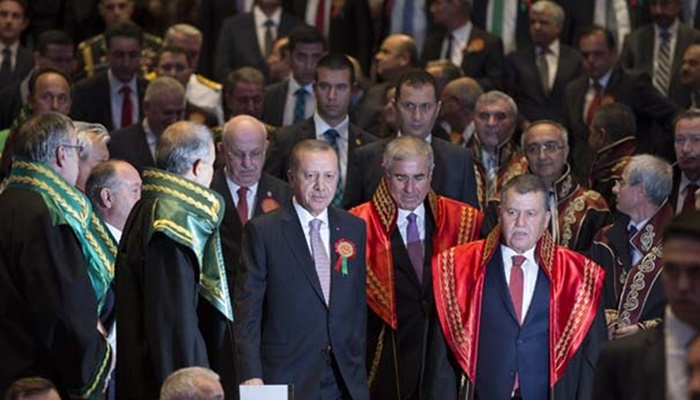The Turkish government has arrested a total of 2,431 judges and prosecutors and dismissed 4,424 others since a botched coup attempt on July 15, 2016, a recent Constitutional Court general assembly ruling revealed.
The Turkish Constitutional Court on July 26 rejected an appeal by Selçuk Özdemir, a judge who was dismissed from his job under an ongoing state of emergency, against a lower court ruling for his arrest over alleged coup involvement.
The members of the court rejected Özdemir’s appeal by a unanimous vote based on Article 100 of the Code on Criminal Procedure, which says: “A ground for arrest may be deemed as existing if the suspect or accused had fled, eluded [authorities] or if there are specific facts which justify the suspicion that he is going to flee.”
According to the 18th and 19th paragraphs of the ruling, since July 15, 2016, a total of 4,664 judges and prosecutors have been investigated, and 2,431 of those were put in pretrial detention by Turkish courts over alleged involvement in the coup attempt and membership in a “terrorist organization.”
A total of 1,311 judges and prosecutors were released pending trial after brief periods of detention. According to the 18th paragraph, as of July 26, six judges were under police custody.
The 19th paragraph revealed that over 4,500 judges and prosecutors were dismissed under eight decrees issued by the Turkish government under the ongoing emergency rule.
On August 5, Turkey’s Constitutional Court rejected the petitions of 70,071 people who were purged from state institutions on the grounds that domestic judicial remedies have not yet been exhausted.
The court announced that it had rejected the petitions because the purge victims had not yet applied to a state of emergency (OHAL) commission established to investigate applications directly related to the loss of state jobs through the issuance of government decrees.
In December, the European Networks of Councils for the Judiciary (ENCJ) suspended the observer status of Turkey’s Supreme Board of Judges and Prosecutors (HSYK) and excluded it from participation in ENCJ activities for the mass suspension and dismissal of judges and prosecutors and the failure to comply with the European Standards for Councils for the Judiciary.
On June 8, Nils Muižnieks, the Council of Europe’s commissioner for human rights, expressed concern about the new composition of HSYK based on amendments which was approved in April 16 referendum, saying it does not offer adequate safeguards for the independence of the judiciary.
Turkey survived a military coup attempt on July 15 that killed 249 people and wounded more than a thousand others. Immediately after the putsch, the Justice and Development Party (AKP) government along with President Tayyip Erdoğan pinned the blame on the Gülen movement.
Fethullah Gülen, who inspired the movement, strongly denied having any role in the failed coup and called for an international investigation into it, but President Erdoğan — calling the coup attempt “a gift from God” — and the government initiated a widespread purge aimed at cleansing sympathizers of the movement from within state institutions, dehumanizing its popular figures and putting them in custody.
Turkey’s Justice Ministry announced on July 13 that 50,510 people have been arrested and 169,013 have been the subject of legal proceedings on coup charges since the failed coup. (Turkey Purge)
